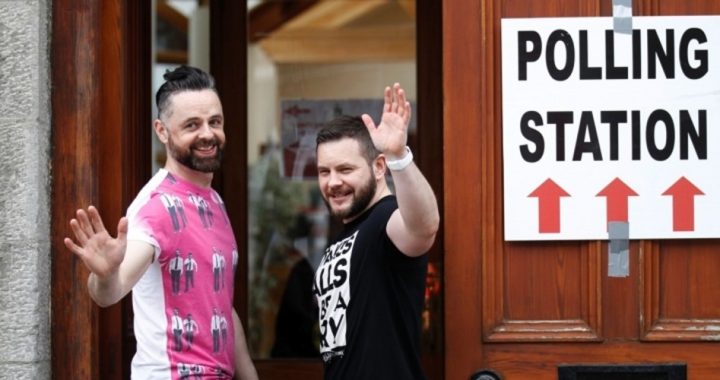
Voters in Ireland went to the polls on May 22 to decide a national referendum to change Ireland’s constitution to give homosexual couples the same right to marry as heterosexual couples. If the referendum passes, it would make Ireland the first nation to legally recognize same-sex “marriage” by popular vote.
In neighboring Northern Ireland, the only part of the United Kingdom that does not recognize same-sex marriage, the Northern Ireland Assembly, controlled by the conservative Protestant Democratic Unionist Party, voted last month to reject same-sex marriage for the fourth time in three years.
The New York Times reported that much of the opposition in the North to giving homosexuals marital rights equivalent to traditional marriages is motivated by the religious convictions stemming from evangelical Protestantism.
The Times noted: “When First Minister Peter Robinson of Northern Ireland [a Pentecostal] defended his wife, Iris, after she described homosexuality as an abomination and advised a gay man it could be “cured” by psychotherapy, he responded, ‘It wasn’t Iris Robinson who determined that homosexuality was an abomination, it was the Almighty.'”
The predominately Catholic, nationalist Sinn Féin party, reports the Times, supports gay marriage in Northern Ireland, but has been unsuccessful in its legislative attempts to implement it.
The support of a Catholic-dominated political party for a living arrangement that the Catholic Church is doctrinally opposed to is fraught with irony. In the Republic of Ireland, where 84 percent of the population identifies itself as Catholic, the referendum will serve to measure the strength the church’s influence in Irish society.
The Irish Catholic Bishops’ Conference published a statement in March that carried the headline: “Marriage Is Important — Reflect Before You Change It.” The statement read, in part:
We come to this debate believing that the union of a man and a woman in marriage, open to the procreation of children, is a gift from God who created us “male and female.” Reason also points to the truth about human sexuality that makes the relationship between a man and a woman unique. Mothers and fathers bring different, yet complementary gifts and strengths into a child’s life.
We cannot support an amendment to the Constitution which redefines marriage and effectively places the union of two men, or two women, on a par with the marriage relationship between a husband and wife which is open to the procreation of children.
However many self-professed Irish Catholics have dissented from their church’s teaching and are supporting the referendum. Among these is Prime Minister Enda Kenny, who said he is supporting change to Ireland’s constitution because “there is nothing to fear for voting for love and equality.”
Father Timothy Hazelwood, a Catholic priest from a rural part of County Cork, told the Irish Times that he supports the referendum because homosexuals are entitled to equal rights. “I feel that as a country and a church we haven’t treated gay people well,” said Hazelwood, “and I said that at the end of Mass on Sunday, when I said I would be voting ‘yes.’ ”
Such public dissent from church teaching, especially speaking from the pulpit, fits the Catholic Church’s definition of the sin of scandal: “an attitude or behavior which leads another to do evil.” Because of his position as a cleric, the offense is more serious, since, the church teaches, “Scandal is grave when given by those who by nature or office are obliged to teach and educate others.”
A report in LifeSiteNews.com on May 20 took Bishop of Derry Donal McKeown to task for his weak-kneed opposition to the referendum. During a debate on Ireland’s popular Shaun Doherty Show, McKeown properly opposed the referendum, warning that legalizing same-sex marriage would be a “dangerous experiment,” especially considering its effects on the lives of children and future generations.
However, the bishop then largely negated what he had accomplished by taking a wishy-washy approach to informing his flock’s consciences:
People have to make their own mature decision, be it yes or be it no. I would hate for people to be voting no for bad reasons, for bigoted reasons, for nasty reasons, for bullying reasons. People have to make up their own minds and I’m quite happy that people can do that in front of God, be it yes or be it no.
I don’t doubt that there are many people who are practicing churchgoers of whatever church background who will in conscience vote Yes, and that’s entirely up to them. I’m not going to say they’re wrong.
Traditionally, churchgoers — “of whatever church background” — have expected their shepherds to guide them in making moral decisions, teaching them the difference between right and wrong.
Perhaps it has been some time since McKeown has read what the Catechism of the Catholic Church has to say about homosexuality and marriage:
2357 “Basing itself on Sacred Scripture, which presents homosexual acts as acts of grave depravity,141 tradition has always declared that “homosexual acts are intrinsically disordered.”142 They are contrary to the natural law. They close the sexual act to the gift of life. They do not proceed from a genuine affective and sexual complementarity. Under no circumstances can they be approved.”
Despite this condemnation of homosexuality, however, the church does not advocate the “bullying” behavior that McKeown fears might motivate some to cast a “no” vote, but implores charity:
2358 “The number of men and women who have deep-seated homosexual tendencies is not negligible. This inclination, which is objectively disordered, constitutes for most of them a trial. They must be accepted with respect, compassion, and sensitivity. Every sign of unjust discrimination in their regard should be avoided.
And yet, the Catechism is very clear about the nature of marriage:
1603 “God himself is the author of marriage.”87 The vocation to marriage is written in the very nature of man and woman as they came from the hand of the Creator.” [Emphasis added.]
The most recent opinion polls indicate that the referendum in Ireland will pass, but strong opposition to it among older, more conservative voters in rural areas could produce an upset. However, if the 84 percent of Irish who identify themselves as Catholic would cast votes informed by the teachings of their Church, the referendum would be rejected by a large margin.
Results are expected to be announced on Saturday.
Update: On May 23, the day after this article was published, electoral officials announced that Irish voters backed legalizing same-sex “marriage” by a landslide, with 62.1 percent voting “Yes” to amend the nation’s constitution to allow same-sex “marriage.” Journalist John Waters, who had campaigned for a “No” vote in the referendum, was quoted in the Irish Examiner as saying that the result of the Marriage Equality Referendum (as it was called) is “catastrophic” for Irish society.
Photo of a same-sex couple at a polling place in Ireland to vote on the referendum: AP Images
Related articles:
Constitutional Crisis: Alabama Battles Feds to Protect Marriage
Red Cross Expels Volunteer Who Opposed Same-sex Marriage
Stop Legalizing Same-sex Marriage!
The Utah Polygamy Ruling and the Tale of the Slippery Slope
Southern Baptist Chaplains Banned From Performing Same-Sex Weddings



